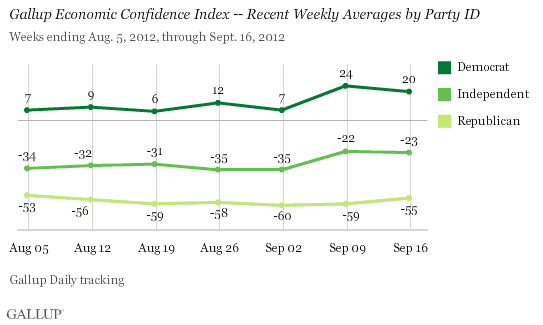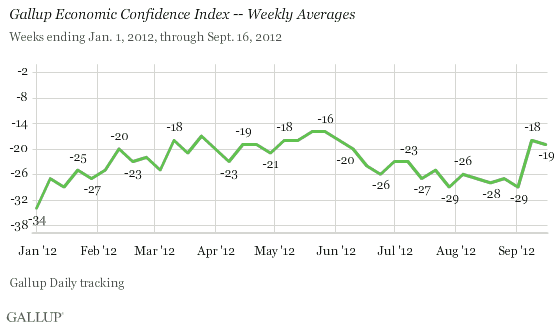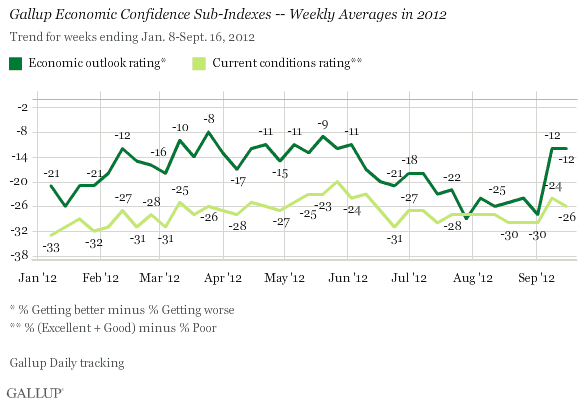PRINCETON, NJ -- Democrats and, to a lesser degree, independents continue to buoy U.S. economic confidence in September. These groups' confidence rose sharply in early September, coinciding with the first day of the Democratic National Convention on Sept. 4, and remained elevated last week. At the same time, at -55, Republicans' overall confidence in the economy remains about as low as it has been since late June.

As a result of these partisan patterns, the overall Gallup Economic Confidence Index is holding steady near the highest level seen this year. The index averaged -19 for the week ending Sept. 16, after surging 11 points the week prior to -18.

Economic Outlook Brightens More Than Current Assessments of the Economy
Of the two measures that make up the Gallup Economic Confidence Index, Americans' outlook for the economy has showed the most improvement in September, thus far.
Americans' net economic optimism -- that is, the percentage saying the economy is getting better minus the percentage saying it is getting worse -- remained at -12 last week, after rising to that level in the week spanning the Democratic convention, which in turn was up from -28 the week prior.
Net perceptions of current economic conditions -- that is, the percentage rating the economy "excellent" or "good" minus the percentage calling it "poor" -- are now -26, down slightly from -24 the week ending Sept. 9, but still slightly better than the -30 at the start of the month.

Bottom Line
If there is any doubt that politics can influence economic confidence, one need look no further than this month's Gallup Daily tracking data. Gallup has long documented that Americans' confidence in the economy, as well as their broader satisfaction with the country's direction, is colored by the party affiliation of the sitting president.
This month, Gallup found a dramatic upward shift in Democrats' and independents' confidence, starting on opening night of the Democratic National Convention. That could have resulted from positive messages about the economy in prime-time speeches by first lady Michelle Obama and San Antonio Mayor Julian Castro. Or it could simply reflect the sense of optimism the convention conveyed about the election, making Democrats and Democratic-leaning independents feel generally more upbeat.
Gallup's initial report on this month's surge in confidence preceded Friday's preliminary Reuters/University of Michigan consumer sentiment index report by several days. The University of Michigan report also showed consumer attitudes improving, confounding experts who had predicted the index would go down, given weak job gains in August and other negative economic signs. Also similar to Gallup's findings, the improvement in the University of Michigan index was seen exclusively in the outlook component. The Conference Board's consumer confidence index, due out Sept. 25, will most likely show a similar rise in confidence -- regardless of whether current attitudes hold up through the end of the month -- because the mail surveys for that index are received mainly in the first half of the month.
Whether any of this has meaningful implications for consumer spending -- and, therefore, for the economy -- is unclear; however, analysts trying to determine that should be aware that the spark behind this month's rise in confidence was more likely political than economic in nature.
Gallup.com reports results from these indexes in daily, weekly, and monthly averages and in Gallup.com stories. Complete trend data are always available to view and export in the following charts:
Daily: Employment, Economic Confidence, Job Creation, Consumer Spending
Weekly: Employment, Economic Confidence, Job Creation, Consumer Spending
Read more about Gallup's economic measures.
View our economic release schedule.
Survey Methods
Results are based on telephone interviews conducted as part of Gallup Daily tracking survey Sept. 10-16, 2012, with a random sample of 3,320 adults, aged 18 and older, living in all 50 U.S. states and the District of Columbia.
For results based on the total sample of national adults, one can say with 95% confidence that the maximum margin of sampling error is ±1 percentage point.
Interviews are conducted with respondents on landline telephones and cellular phones, with interviews conducted in Spanish for respondents who are primarily Spanish-speaking. Each sample includes a minimum quota of 400 cell phone respondents and 600 landline respondents per 1,000 national adults, with additional minimum quotas among landline respondents by region. Landline telephone numbers are chosen at random among listed telephone numbers. Cell phone numbers are selected using random-digit-dial methods. Landline respondents are chosen at random within each household on the basis of which member had the most recent birthday.
Samples are weighted by gender, age, race, Hispanic ethnicity, education, region, adults in the household, and phone status (cell phone only/landline only/both, cell phone mostly, and having an unlisted landline number). Demographic weighting targets are based on the March 2011 Current Population Survey figures for the aged 18 and older non-institutionalized population living in U.S. telephone households. All reported margins of sampling error include the computed design effects for weighting and sample design.
In addition to sampling error, question wording and practical difficulties in conducting surveys can introduce error or bias into the findings of public opinion polls.
For more details on Gallup's polling methodology, visit www.gallup.com.
